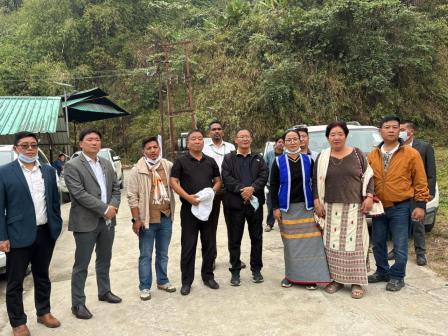-
COPU reviews state PSUs in second sitting
-
CM stresses on strong internal security, tech-driven policing
-
Cabinet approves proposals aimed at strengthening governance, enhancing public…
-
Body found hanging at bus stop with limbs tied sparks…
-
Mein chairs pre-budget consultative meeting with community based organisations
-
District level training on Census of India 2027 begins at…
-
WCD Minister reiterates commitment to safeguarding rights, dignity of…
-
Woman loses life in massive fire, two children seriously injured
-
 UA Minister inspects burial ground, focuses on maintenance and improvement
UA Minister inspects burial ground, focuses on maintenance and improvement
-
 UA Minister inspects burial ground, focuses on maintenance and improvement
UA Minister inspects burial ground, focuses on maintenance and improvement
Over the years there has been a steady attempt to popularizeAYUSH (Ayurveda, Yoga or Naturopathy Unani, Siddha and Homoeopathy) and present it as another reliable branch of medicine. Despite the government's attempt, the people at large are still inclined towards allopathy treatment both in rural and urban India.
Most Indians still seek the services of private, allopathic doctors when they are unwell, confirms a recent survey by the National Sample Survey Office (NSSO). The majority of urban and rural respondents in the survey expressed a preference for private doctors and allopathic treatments over AYUSH remedies, reflecting the higher value attributed to modern medicine.
The survey found 90% people in both rural and urban areas inclined towards allopathy treatment and only 5-7% using ‘other’ type of treatment including AYUSH.
Indeed, several barriers to the integration of AYUSH with modern healthcare systems exist today, primarily the fact that practitioners of ayurveda or homoeopathy differ from allopaths in their understanding of anatomy, physiology, and disease and its treatment. Lack of scientific validation and credible evidence of the effectiveness and safety of AYUSH therapies is another deterrent.
However, adopting the attitude that it is impossible to align such radically different therapeutic philosophies and create what is being embraced as “complementary” medicine the world over, is defeatist.
Though cross-practice is legally prohibited in India, the time has come to review the implications of this ban — the idea may have been to prevent quackery, but that is outdated today as it inhibits the possibility of integrated medical prescriptions, and limits the future of integrative medicine in the country.
Philosophically divergent systems can be brought together only when systems and their practitioners are open to learning and evolution.
This requires trust building between allopaths and practitioners ofAYUSH, an understanding of strengths and weaknesses of each system, and an establishment of accountability mechanisms.
Identifying and documenting which illnesses respond best to which systems of medicine, and establishing treatment protocol, will enable us to realise the vision of integrative medicine.-

Kenter Joya Riba
(Managing Editor)She is a graduate in Science with post graduation in Sociology from University of Pune. She has been in the media industry for nearly a decade. Before turning to print business, she has been associated with radio and television.
Email: kenterjoyaz@easternsentinel.in / editoreasternsentinel@gmail.com
Phone: 0360-2212313

